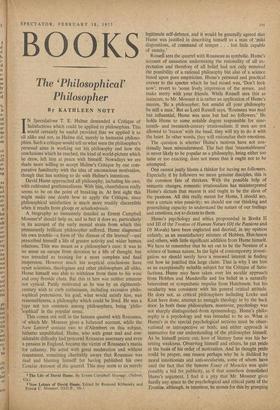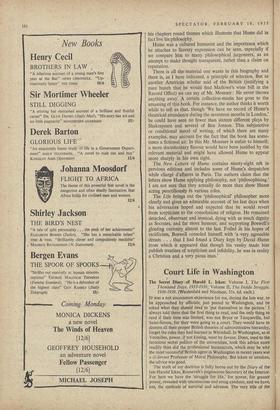The 'Philosophical' Philosopher
By KATHLEEN NOTT IN Speculations T. E. Hulme demanded a Critique of Satisfactions which could be applied to philosophies. This would certainly be useful provided that we applied it to all alike and not, as Hulme did, merely to humanist philoso- phies. Such a critique would tell us what were the philosopher's personal aims in working out his philosophy and how the conclusions which he reached, the kind of world-picture which he drew, left him at peace with himself. Nowadays we are made more willing to accept Hulme's Critique by our com- parative familiarity with the idea of unconscious motivation, though that has nothing to do with Hulme's intentions.
David Hume approached all philosophy, including his own, with cultivated gentlemanliness. With him, cheerfulness really seems to be on the point of breaking in. At first sight this might make one doubt how to apply the Critique, since philosophical satisfaction is much more readily discernible when it results from gloom or schadenfreude.
A biography so immensely detailed as Ernest Campbell Mossner's1 should help us, and in fact it does so, particularly in its account of the early mental strain from which this prematurely brilliant philosopher suffered. Hume diagnosed his own trouble—a form of 'the disease of the learned'—and prescribed himself a life of greater activity and wider human relations. This was meant as a philosopher's cure; it was in no sense an escape from devotion to a life of thought, but was intended as training for a more complete and final immersion. However much his sceptical conclusions have upset scientists, theologians and other philosophers all alike, Hume himself was able to withdraw from them to his wine and cosy fireside chats. But this in him was neither amateur nor cynical. Partly motivated as he was by an eighteenth- , century wish to curb enthusiasm, including excessive philo- sophical pretensions, his goal, what would satisfy him, was reasonableness, a philosophy which could be lived. He was a type not too common among philosophers, being 'philo- sophical' in the popular sense.
This comes out well in the famous quarrel with Rousseau, of which Mr. Mossner gives a balanced account, while the New Letters2 contain two to d'Alembert on this subject, hitherto unpublished. Hume, who with great zeal and con- siderable difficulty had'procured Rousseau sanctuary and even a pension in England, became the victim of Rousseau's mania ,for calumny. He acted with great moderation and without resentment, remaining charitably aware that Rousseau was mad and blaming himself for having published his own Concise Account of the quarrel. This may seem to us merely legitimate self-defence, and it would be generally agreed that Hume was justified in describing himself as a man of 'mild dispositions, of command of temper . . . but little capable of enmity.'
Russell sees the quarrel with Rousseau as symbolic. Hume's account of causation undermining the rationality of all ex- pectation and therefore of all belief had not only removed the possibility of a rational philosophy bit also of a science based upon pure empiricism. Hume's personal and practical answer to the spectre which he had raised was, 'Don't look now'; revert to 'some lively impression of the senses, and make merry with your friends. While Russell sees this as insincere, to Mr. Mossner it is rather an application of Hume's maxim, 'Be a philosopher; but amidst all your philosophy be still a man' But as Lord Russell says, 'Rousseau was mad but influential, Hume was sane but had no followers.' He holds Hume to some notable degree responsible for nine- teenth- and twentieth-century irrationalism; if men are not allowed to 'reason' with the head, they will try to do it with the heart. In other words, they will rationalise their emotions.
The question is whether Hume's motives have not con- tinually been misunderstood. The fact that 'reasonableness' is never likely to be popular as a philosophy, being either too tame or too exacting, does not mean that it ought not to be attempted. One cannot justly blame a thinker for having no followers. Especially if by followers we mean genuine disciples, this is the common fate of thinkers. With the possible help of semantic changes, romantic irrationalism has misinterpreted Hume's dictum that reason is and ought to be the slave of the passions. All this really meant for Hume, I should say, was a certain wise passivity; we should use our thinking and generalising capacity to understand the nature of our feelings and emotions, not to dictate to them. Hume's psychology and ethics propounded in Books II and III of the Treatise of Human Nature (Of the Passions and Of Morals) have been neglected and decried, in my opinion unfairly, as an unsatisfactory mixture of Hobbes, Hutcheson and others, with little significant addition from Hume himself. We have to remember that he set out to be the Newton of a science of human nature. In the light of contemporaty investi- gation we should surely have a renewed interest in finding out how he justified this large claim. That is why I see him as an exceptionally suitable subject for the Critique of Satis- factions. Hume may have taken over his secular approach from Hobbes and Mandeville and his belief in a naturally benevolent or sympathetic impulse from Hutcheson, but his secularity was consistent with his general critical attitude. He does not, as critical philosophers including Locke and Kant have done, attempt to smuggle theology in by the back door. In both these philosophers, moreover, psychology was not sharply distinguished from epistemology. Hume's philo- sophy is a psychology and was intended to be so. What is Humes in the special psychological sections must be obser- vational or introspective or both; and either approach is instructive for our understanding of the philosopher himself. As he himself points out, love of literary fame was his be- setting weakness. Observing himself and others, be put pride at the basis of his order of motivation. And he thought pride could be proper, one reason perhaps why he is disliked by moral intuitionists and anti-secularists, some of whom have used the fact that the famous Essay of Miracles was quite possibly a bid for publicity, as if that somehow demolished his chapters round themes which illustrate that Hume did in fact live his philosophy. Hume was a cultured humanist and the importance which he attaches to literary expression can be seen, especially if we compare him to many philosophical jargoneers; as an attempt to make thought transparent, rather than a claim on reputation.
There is all the material one wants in this biography and there is, as I have indicated, a principle of selection. But as another American scholar said of the British (justifying a pure hunch that he would find Marlowe's wine bill in the Record Office) we can say of Mr. Mossner: He never throws anything away. A certain collection-mania has gone to the amassing of this book. For instance, the author thinks it worth while to tell us that, though 'We have no record of Hume's theatrical attendance during the seventeen months in London,' he could have seen no fewer than sixteen different plays by Shakespeare and several of Ben Jonson. This subjunctive or conditional mood of writing, of which there are many examples, may account for the fact that the book has some- times a fictional air. In this Mr. Mossner is unfair to himself; a more documentary flavour would have been justified by the relevant material and might have allowed Hume to appear more sharply in his own right.
The New Letters of Hume contains ninety-eight not in previous editions and includes some of Hume's despatches while chargé d'affaires in Paris. The authors claim that the letters show Hume applying philosophy, not 'philosophising.' I am not sure that they actually do more than show Hume acting punctiliously in various roles.
The Life brings out the 'philosophical' philosopher more clearly and gives an admirable account of his last days When his adversaries hoped and expected that he would revert from scepticism to the consolations of religion. He remained detached, observant and ironical, dying with as much* dignity as Socrates, and far more humour, and supporting Boswell's gloating curiosity almost to the last. Foiled in his hopes of recidivism, Boswell consoled himself with 'a -very agreeable dream . . . that I had found a Diary kept by David -Hume from which it appeared that though his vanity made him publish treatises of scepticism and infidelity, he was in reality a Christian and a very pious man.'











































 Previous page
Previous page